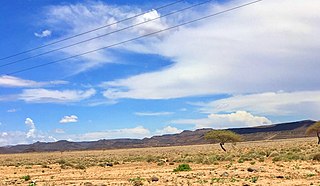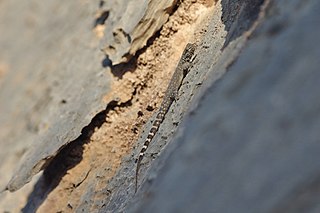
Pristurus is a genus of geckos endemic to Arabia and Socotra Island as well as the Middle East and the Horn of Africa. Species of Pristurus are commonly known as rock geckos .

The Somali fiscal is a species of bird in the family Laniidae. Other common names include the Karoli fiscal, the Somali fiscal shrike and the Somali shrike. The bird is found in Djibouti, Ethiopia and Somalia in the Horn of Africa, as well as in Kenya in the African Great Lakes region. Its natural habitat is subtropical or tropical dry shrubland.

Pristurus carteri, commonly known as Carter's rock gecko or Carter's semaphore gecko, is a species of gecko, a lizard in the family Sphaerodactylidae. The species is endemic to the Sinai Peninsula.

The Ethiopian xeric grasslands and shrublands ecoregion is a semi-desert strip on or near the Red Sea and the Gulf of Aden coasts in Eritrea, Ethiopia, Djibouti and Somaliland. This ecoregion lies mainly between sea level and 800 meters (m) elevation. There are, however, many hills and massifs, which range up to 1300 m as well as outstanding fault-induced depressions, such as the Danakil, lying as low as 155 m below sea level. This region is extremely active tectonically, experiencing many earthquakes and intermittently active volcanoes. Rainfall is very low and yearly averages range from 100 to 200 millimeters (mm), with less rain falling closer to the coast. There are many species of interest, including the endemic Archer's lark, a species of dragon tree, and a large suite of desert ungulates, including the last viable population of African wild ass.
Eryx somalicus, known commonly as the Somali sand boa, is a species of small snake in the Boidae family. As its scientific name and common name suggest, it is found in Somalia, but may also be present in eastern Ethiopia.

The Grand Bara, Bara Wein or Bada Wein, is a desert in southern Djibouti. It consists of large areas of sand flats, with sparse, semi-desert and desert grasses and scrub vegetation. A road built in 1981 passes through the area, connecting the capital Djibouti City with the south. Prior to the arrival of the French, the extremely arid interior was inhabited primarily by the Issa Somali. Runners make their way across the Grand Bara Desert during the Annual Grand Bara 15K race.

Pristurus rupestris, also known as the rock semaphore gecko, Blanford's semaphore gecko, and Persia rock gecko, is a species of gecko in genus Pristurus which occurs in Arabia, Iran, Pakistan, Somalia, and Eritrea. This species lives in stony formations, mainly in flat, hard, sandy, barren regions and gravelly plains. It also lives in open, dry forest and bushland. It can be found under stones, on the walls of buildings, and on beaches. It is an egg-laying species.
The Northern Somali leaf-toed gecko is a species of gecko. It is found in Somaliland and Ethiopia.
The Somali dwarf gecko is a species of gecko found in northern Kenya, Somalia and Ethiopia.
The Parker's pigmy gecko is a species of gecko of the genus Tropiocolotes. It is found in Somalia, Ethiopia and Djibouti.

Pristurus celerrimus, also known as the Oman rock gecko or bar-tailed semaphore gecko, is a species of lizard in the Sphaerodactylidae family found in Oman and the United Arab Emirates.
Pristurus crucifer, also known commonly as the cross-marked semaphore gecko or Valenciennes rock gecko, is a species of lizard in the family Sphaerodactylidae. The species is native to eastern Africa and western Asia.
Pristurus flavipunctatus, also known as Rüppell's semaphore gecko or Middle Eastern rock gecko , is a species of lizard in the Sphaerodactylidae family found in Ethiopia, Saudi Arabia, Egypt, Djibouti, Somalia, Sudan, Eritrea, and Jordan.
Pristurus insignis, also known as Blanford's rock gecko, is a species of lizard in the Sphaerodactylidae family found on Socotra Island.

Pristurus minimus, also known as Arnold's rock gecko or least semaphore gecko, is a species of lizard in the Sphaerodactylidae family found in Oman, the United Arab Emirates, and Yemen.
Pristurus phillipsii, known commonly as Phillip's rock gecko or the Somali rock gecko, is a species of lizard in the family Sphaerodactylidae. The species is endemic to the Horn of Africa.
The Saudi rock gecko is a species of lizard in the family Sphaerodactylidae. The species is endemic to the Arabian Peninsula.
The coastal rock gecko is a species of lizard in the family Sphaerodactylidae. The species is endemic to Somalia.
There are two species of gecko named Somali rock gecko:

The Al Hajar montane woodlands is a temperate grasslands, savannas, and shrublands ecoregion in the Al Hajar Mountains on the eastern Arabian Peninsula, which extends across portions of Oman and the United Arab Emirates.








